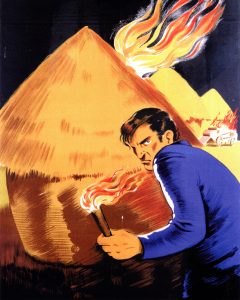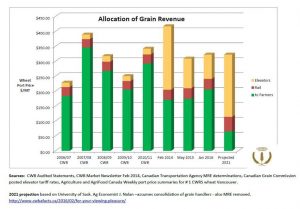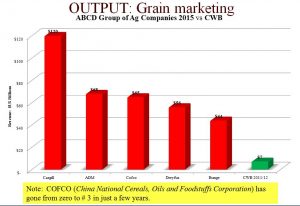(August 1, 2017) The end of the Canadian Wheat Board five years ago certainly proves that unregulated capitalism works very effectively for the powerful and well organized. Declining numbers and increasing debt show it does not work for farmers.
The CWB was a hybrid organization providing farmers with collective bargaining power, a professional standards association, and a world-wide reputation for honesty, quality-assured product, and reliable delivery.
Oh, and it also dependably got farmers 88% or better of the world price for their grain after all the costs for transportation and marketing had been paid. Now farmers are lucky to get 60% of the world price and the private trade is scooping up record profits from money that once ended up in farmers’ bank accounts. Their local communities are seeing less spending thanks to farmers’ declining share of the world price too.
Prairie farmers also had a very efficient storage and transportation system which was “right sized” to handle the whole prairie grain crop due to the CWB’s intelligent management. Now that intelligence is gone and the private trade is racing to make farmers pay for increased capacity in both inland storage facilities and port terminals.
Never-the-less the vast majority of prairie delivery points are only serviced by a single company — two thirds in Manitoba and three quarters of the points in Alberta and Saskatchewan have only one elevator company. So most farmers are finding themselves at the mercy of only one grain company and their new master is the elevator agent who decides which farmers get to deliver grain, when, and what each farmer gets paid.
The irony of having less choice as a result of a vociferous minority attacking the CWB demanding more choice is not lost on those who understand how the system works.
One of the first things that happened with the end of the CWB was an avalanche of complaints from former customers about poor quality control and unreliable delivery. The end result was one of those customers, the Government of China, used its economic muscle to push aside the much reviled private grain trade and establish its own central grain trading agency (COFCO) as the third largest grain trader on the planet pushing the smaller Louis Dreyfus and Bunge down to fourth and fifth place.
This changed the 140 year old order of the ABCD group of oligarchs on their perches but does nothing for prairie farm gate prices. Combine this upset with further consolidation of prairie grain handling and it makes the predictions from a U of Sk. Ag Economist that farmers will see their share of the grain price pushed down to just 20% seem closer to reality.
Now that the CWB is no longer there to speak to the importance of quality control and meeting customer demands, as they did when Monsanto attempted to introduce GM wheat some years ago, we are also seeing moves to further privatize the cereals genome. We must remember this genome was paid for by prairie farmers and Canadian tax payers for the public good.
Those are the big changes, but there have been relatively smaller ones as well, not least of which is the loss of Canada’s only northern sea port and its physical isolation with the loss of the Churchill rail line.
Western historian Patricia Limerick suggests: “the frontier ends when the pimps come to town” something prairie grain growers are becoming all too familiar with as they negotiate a world without the CWB in which they no longer have any control and precious little dignity.





Trudeau needs to rebuild the Canadian Wheat Board, and the renegotiation of NAFTA is an obvious opportunity.
Getting rid of the CWB got rid of me as a grain farmer, I am simply not prepared to lose money that is used to subsidize private corporation instead. Smarter to find a niche in agriculture where you are in control of your own destiny; that is what I choose and it is working. Missed grain farming for a while but, don’t now that the profits all goes to the grain companies not the farmer as it did before the Pool and the CWB came to be.